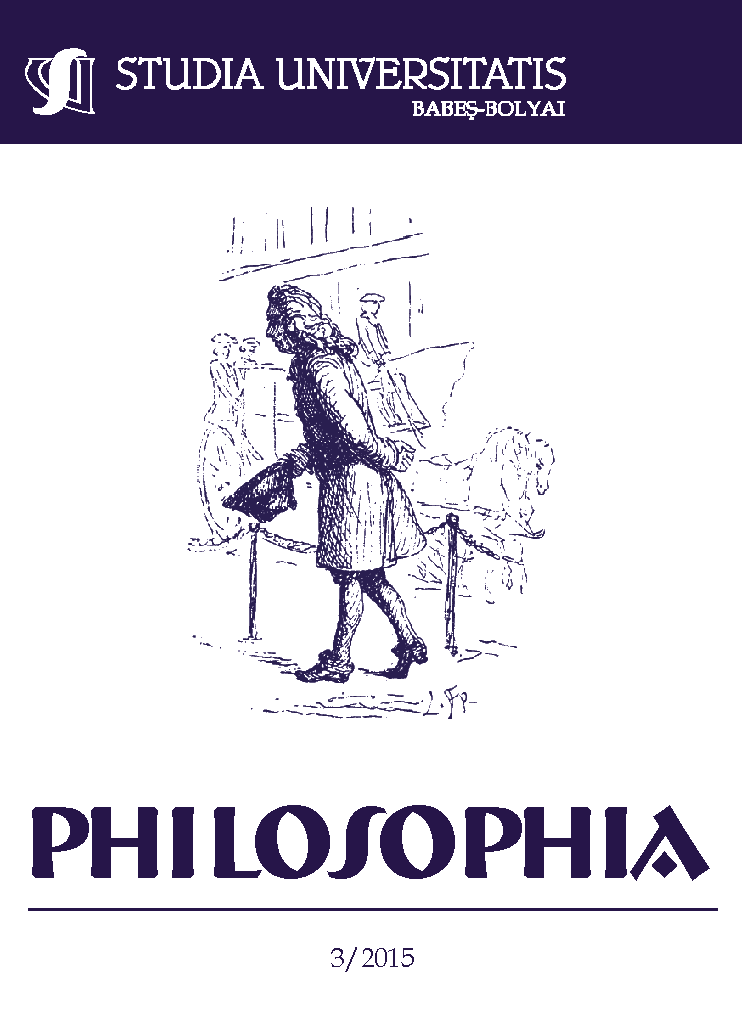ARGUMENTS FOR A KIERKEGAARDIAN REREADING OF POSTMODERNITY AT THE LEVEL OF A KEY-(ARCHI)TECTONIC SHIFT: THE KAIROS
Keywords:
Kairos, the uncreated as generous-potency, Kierkegaardian re-reading of postmodernity, paradox, vortex, chaosAbstract
The present study attempts to legitimize a re-reading of postmodernity’s utter confusions and con-fusions (modern man’s loss of the sense of the Self, his weird panic attacks, his dissipations, his loss of personal and collective magnetisms [of faith], his parapsychological and crypto-phenomenological impels to disengage from his objective boundaries) at the level of that special type of vortical dynamics induced by Kierkegaard’s notion of leap (kairos). The accumulated pain coming towards us from the tension of the eternal human incompleteness (constant para-archi-tectonic inconsistency, impossibility to complete cycles, ontological instability and resistance to total representations) of paradoxes proves itself to be the very “fuel” necessary in the enactment of the leap (of the kairos) from one existential level to another. In essence, it is a chaos-filled transition towards the origin of chaos and of creation, towards the uncreated as generous-potency-to-be-apprehended and internalized by the stellar desirer and by the stellar seducer. Every kairos is a personal (and heavily personalized) spiritual exercise for re-enacting the primal movement of the uncreated towards the fragile intricacies of creation. It is an enthroned heterogeneity with its crown made of the fertile plasma of all boiling homogeneities.References
Aubenque, Pierre. (1976). La prudence chez Aristote (Aristotle's Prudent Man). Second edition. Paris: Presses Universitaires de France.
Beauvoir, S. de (2009). The Second Sex. Translated by C. Borde and S. Malovany-Chevallier, New York: Alfred Knopf.
Couture, Barbara. (1998). Toward a Phenomenological Rhetoric: Writing, Profession, and Altruism. Carbondale (Illinois): Southern Illinois University Press.
Diaconu, Mădălina. (1996). Pe Marginea Abisului, Søren Kierkegaard şi nihilismul secolului al XIX (On the Edge of the Precipice, Søren Kierkegaard and the Nihilism of the 19th Century). Bucureşti: Editura Ştiinţifică.
Flynn, R. Thomas. (2006). Existentialism. A Very Short Introduction. New York: Oxford University Press.
Foucault, Michel. (1984). “What is Enlightenment?” (“Qu’est-ce que les Lumières ?”), pp. 32-50, in The Foucault Reader. Rabinow P. (ed.). New York: Pantheon Books.
Gardiner, Patrick. (1988). Kierkegaard. Oxford University Press: Oxford.
Gutting, Gary. (2003). “Sartre, Foucault and Derrida”, pp. 860-874, in The Blackwell Companion to Philosophy, Second Edition. Nicholas Bunnin and Eric P. Tsui-James (eds.). Malden (MA) and Oxford: Blackwell.
Kierkegaard, Søren. (1980). The Concept of Anxiety. A Simple Psychologically Orienting Deliberation on the Dogmatic Issue of Hereditary Sin. Edited and Translated with Introduction and Notes by Reidar Thomte in collaboration with Albert B. Anderson. Princeton University Press: New Jersey.
Kierkegaard, Søren. (2013). Fear and Trembling: A Dialectical Lyric and The Sickness Unto Death. Translated by Walter Lowrie. Princeton: Princeton University Press.
Kramer, Nathaniel. (2009). “August Bournonville: Kierkegaard’s Leap of Faith and the ‘Noble Art of Terpsichore’”, pp. 67-82, in Kierkegaard and His Danish Contemporaries: Literature, drama, and aesthetics. Jon Bartley Stewart (ed.). Farnham & Burlington: Ashgate Publishing, Ltd.
Land, Nick. (1990). Thirst for Annihilation: Georges Bataille and Virulent Nihilism. New York: Routledge.
Lefebvre, Henri. (1995). Introduction to Modernity: Twelve Preludes, September 1959-May 1961. Translated by John Moore. London: Verso Press.
Lukes, Daniel. (2013). “Black Metal Machine. Theorizing Industrial Black Metal.” in Helvete (A Journal of Black Metal Theory). Issue 1: Incipit, Winter 2013, pp. 69-93, Brooklyn (New York): punctum books.
Melville, Herman. (2014). Moby-Dick. Kreactiva Editorial: on line variant of the novel.
Pigeaud, Jackie. (2001). “Préface. Louis Guillermit, lecteur de Platon” (“Preface. Louis Guillermit, reader of Plato”), pp. 9-24, in Guillermit, Louis. (2001). L'enseignement de Platon (The Teachings of Plato), Volume 2. Nîmes: éditions de l’éclat.
Ricoeur, Paul. (1976). “L’herméneutique de la sécularisation. Foi, idéologie, utopie” (“The Hermeneutics of Secularization. Faith, Ideology and Utopia”), pp. 49-68, in Herméneutique de la sécularisation: actes (The Hermeneutics of Secularization: Proceedings). Enrico Castelli (ed.). Paris: Éditions Aubier-Montaigne.
Romeyer-Dherbey, Gilbert. (1999). La parole archaïque (The Archaic Word). Paris: Presses universitaires de France.
Vernant, Jean Pierre. (1969). Mythe et pensée chez les Grecs: études de psychologie historique (Myth and Thoughtamong the Greeks: Studies in HistoricalPsychology). Paris: François Maspero.
Ward, Koral. (2012). Augenblick: The Concept of the 'Decisive Moment' in 19th- and 20th-Century Western Philosophy. Burlington & Aldershot: Ashgate Publishing.
Weil, Simone. (2003). Gravity and Grace.Translated by Emma Crawford and Mario von der Ruhr. London and New York: Routledge.
West, David. (1995). “The Contribution of Continental Philosophy”, pp. 39-71, in A Companion to Contemporary Political Philosophy. Robert E. Goodin and Philip Pettit (eds.). Oxford and Cambridge (Massachusetts): Blackwell Publishers.
Woodard, Ben. (2013). On an Ungrounded Earth (Towards a New Geophilosophy). Brooklyn, New York: Punctum Books.
Downloads
Published
How to Cite
Issue
Section
License
Copyright (c) 2015 Studia Universitatis Babeș-Bolyai Philosophia

This work is licensed under a Creative Commons Attribution-NonCommercial-NoDerivatives 4.0 International License.





